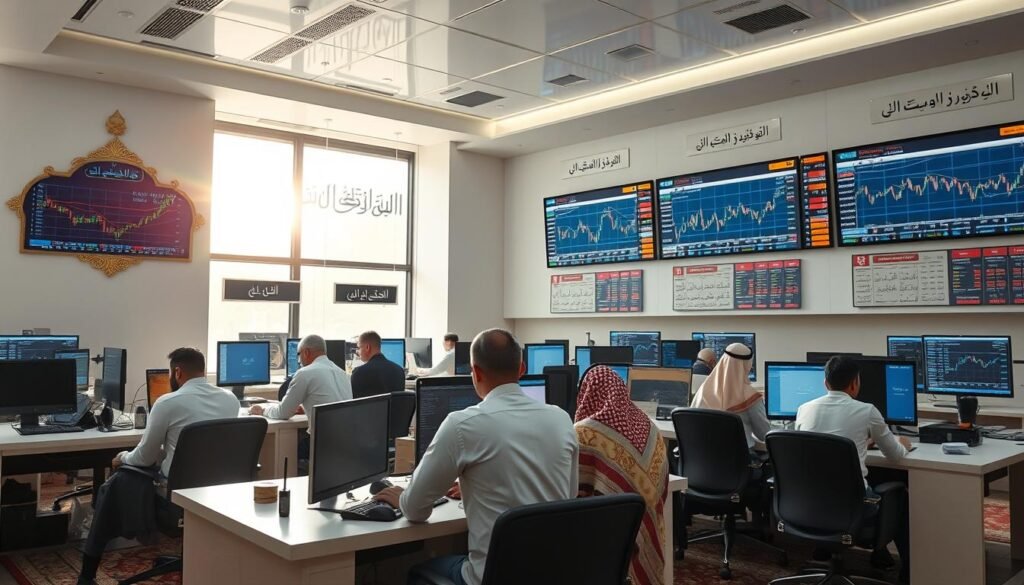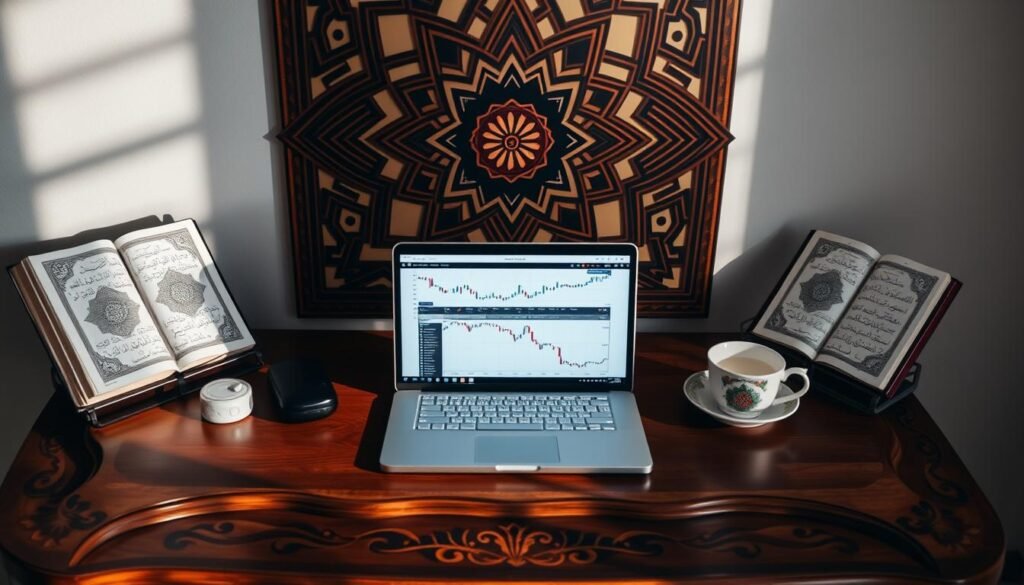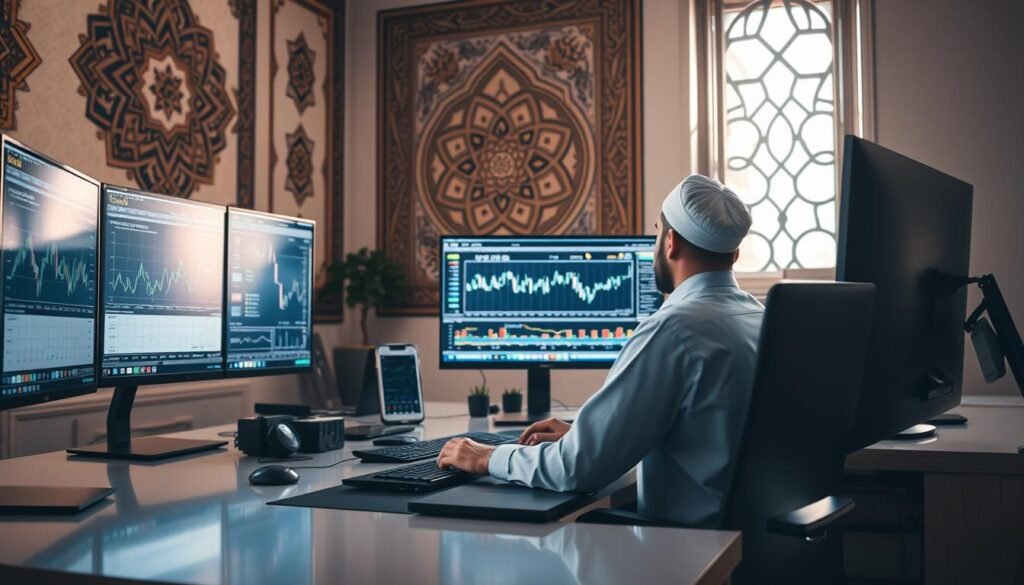Islamic Forex Brokers: Halal Trading Options
In the fast-paced world of global finance, Kenyan Muslims are looking for Islamic forex brokers with halal trading options. These brokers offer a solution for investors wanting to follow their religious beliefs in trading. They provide a way to trade ethically and in line with Islamic finance principles.
This article explores the world of Islamic forex brokers. We look at the basics of Islamic finance and why Muslim-friendly forex platforms are important. We’ll discuss the benefits of using these brokers, like Islamic swap-free accounts and interest-free forex trading. This helps Kenyan investors make smart choices and trade ethically.
Key Takeaways
- Understand the principles of Islamic finance and the need for Sharia-compliant forex trading options
- Discover the benefits of trading with Islamic forex brokers, including swap-free accounts and interest-free transactions
- Learn about the top Islamic forex brokers that are reputable and regulated in the industry
- Explore the factors to consider when choosing the right Islamic forex broker for your trading needs
- Gain insights into Islamic forex trading strategies and risk management practices
Introduction to Islamic Forex Trading
In the fast-paced world of forex trading, more Muslims are looking for options that fit their beliefs. Islamic forex trading is becoming a popular choice. It offers Sharia-compliant platforms that meet the Islamic finance community’s needs.
Understanding the Principles of Islamic Finance
Islamic finance forex is based on Sharia-compliance. This means no interest-free forex trading, or “riba,” and no speculative or unethical practices. It focuses on profit-and-loss sharing, showing the ethical use of capital.
The Need for Halal Forex Trading Options
Many Muslim traders want no riba forex brokers for sharia-compliant trading accounts. They aim for ethical forex trading that matches their faith. This need has led to the rise of Islamic finance forex brokers, serving this growing market.
Knowing Islamic finance’s core principles and the demand for Sharia-compliant trading helps traders. It opens up a world of opportunities in Islamic forex trading.
What is an Islamic Forex Broker?
In the world of foreign exchange (forex) trading, Islamic forex brokers cater to Muslim traders. They provide a trading environment that follows Islamic finance principles. This ensures their services meet the needs of Muslim traders.
These brokers follow Islamic law closely. They avoid using interest (riba) and speculation (gharar) in transactions. Instead, they offer swap-free accounts. This means no overnight interest payments, which are not allowed under Sharia.
Islamic forex brokers offer a variety of services. They provide islamic forex brokers, sharia-compliant brokers, and muslim-friendly forex platforms. These services do not include interest-bearing instruments or short-selling. They focus on asset-backed trading, following Islamic finance principles.
| Key Characteristics of Islamic Forex Brokers | Description |
|---|---|
| Sharia-Compliant Trading | Ensures all trading activities adhere to Islamic financial principles, prohibiting interest-based transactions and speculative activities. |
| Swap-Free Accounts | Offers trading accounts that eliminate the need for overnight interest payments, which are considered non-compliant with Sharia guidelines. |
| Interest-Free Transactions | Facilitates forex trading without the involvement of interest-bearing instruments, in accordance with Islamic finance principles. |
Understanding islamic forex brokers helps Muslim traders find halal trading options. These options align with their religious beliefs and financial principles. This way, they can trade in the forex market while staying true to their values.
Benefits of Trading with Islamic Forex Brokers
For Muslim investors in Kenya, Islamic forex brokers have changed the game. They offer benefits that meet Islamic finance needs. This makes them a great choice for those who follow Sharia law.
Sharia-Compliant Trading Accounts
Trading with Islamic forex brokers means getting Sharia-compliant accounts. These accounts follow Islamic finance rules. They ensure all trades are free from riba and other banned activities.
This lets Kenyan Muslim traders join the forex market. They can do so while keeping their religious and ethical standards.
Interest-Free and No Riba Transactions
Islamic forex brokers also offer interest-free and no riba trades. This is key for Kenyan Muslim investors, as interest is forbidden in Islam. These brokers provide a Halal option for traditional forex trading.
Islamic forex brokers help Kenyan Muslim traders in interest-free forex trading. They can grow their wealth without going against their faith. This lets them diversify their investments and trade ethically.
“Engaging in Halal forex trading with Islamic brokers allows me to grow my wealth while staying true to my faith. It’s a win-win situation.”
– Fatima Ahmed, Kenyan Muslim Investor
Top Islamic Forex Brokers
Finding a reliable Islamic forex broker is key. Luckily, many reputable brokers serve Muslim investors in Kenya. They offer features that meet Islamic finance needs, ensuring a fair trading experience.
Reputable and Regulated Brokers
Amana Capital is a top choice in Kenya. It follows Sharia law and has many Sharia-compliant accounts. This makes it a favorite among Muslim traders.
Dukascopy Bank is another great option. Based in Switzerland, it focuses on Islamic finance. It provides tools and resources for Muslim traders to trade confidently.
AlRayan Bank is also well-known in Kenya. It offers Sharia-compliant trading solutions. This includes accounts without margins and special investment options for Muslims.
These brokers are trusted by many Muslim traders in Kenya. When choosing, check their credentials and Sharia-compliant features. This ensures a good trading experience.
islamic forex brokers
In the world of international finance, islamic forex brokers have opened doors for Muslim traders. They can now trade currencies that fit their religious beliefs. These sharia-compliant brokers provide special features and services for muslim-friendly forex platforms.
Islamic forex trading avoids interest, known as “riba” in Sharia law. Islamic brokers make sure their products and services follow these rules. This gives traders a halal option instead of traditional forex trading.
| Feature | Conventional Forex Brokers | Islamic Forex Brokers |
|---|---|---|
| Interest-based Transactions | ✓ | ✗ |
| Overnight Holding Fees | ✓ | ✗ |
| Swap-free Accounts | ✗ | ✓ |
| Sharia-compliant Funding | ✗ | ✓ |
Swap-free accounts and sharia-compliant funding options are key for Islamic forex brokers. They let Muslim traders join the forex market without breaking their religious rules. This focus on Sharia-compliant trading attracts many ethical and responsible investors.
The need for halal financial services is growing. The world of islamic forex brokers is set to change with new technology and trading platforms. Understanding these sharia-compliant brokers helps traders find platforms that match their values and beliefs.
Choosing the Right Islamic Forex Broker
Choosing the right broker for Islamic forex trading is key. As a Muslim trader in Kenya, you must find a broker that follows Sharia-compliant rules. They should also offer a trading experience that meets your religious and financial needs.
Factors to Consider
To find the right islamic forex brokers, consider these important factors:
- Regulatory Compliance: Choose sharia-compliant brokers that are overseen by top financial bodies. This ensures your trading is safe and secure.
- Sharia-Compliant Accounts: Make sure the broker has islamic swap-free accounts. These accounts follow Islamic finance rules, avoiding interest.
- Interest-Free Trading: Go for brokers that offer interest-free forex trading. They should not use riba (interest) in their operations.
- Reputation and Customer Service: Check the broker’s history, customer feedback, and support for muslim-friendly forex platforms.
By looking at these points, you can find a no riba forex brokers. They should meet your Sharia-compliant needs and provide a great trading experience.

“Choosing the right Islamic forex broker is essential for Kenyan traders who want to engage in ethical and Halal trading practices.”
Your broker choice greatly affects your trading path. So, spend time researching and comparing to find the best fit for your needs as a devout Muslim trader.
Islamic Forex Trading Strategies
For devout Muslim investors, forex trading is a delicate balance. It must align with financial growth and religious principles. Halal forex trading strategies help Kenyan Islamic forex investors do just that. They can participate in global currency markets while staying true to their beliefs.
Islamic forex investment avoids riba, or interest-based transactions. Successful ethical forex trading uses swap-free Islamic trading accounts. These accounts eliminate interest payments and follow Sharia law. Muslim traders also focus on risk management, like stop-loss orders and disciplined position-sizing.
- Leverage Swap-Free Islamic Accounts: Choose forex brokers with Sharia-compliant, interest-free trading accounts. This ensures your transactions follow Islamic finance principles.
- Employ Risk Management Techniques: Use strict risk management, such as stop-loss orders and responsible position-sizing. This protects your capital and minimizes losses.
- Avoid Speculative Trading: Stay away from highly speculative trading strategies. Instead, use conservative, long-term approaches that focus on fundamental analysis and patience.
- Educate Yourself: Keep learning about halal forex trading principles, strategies, and best practices. This helps you make informed investment decisions.
By using these Islamic forex trading strategies, Kenyan Muslim investors can trade in currency markets. They do this while upholding their religious and ethical values. This contributes to the growth of the halal forex trading ecosystem in the region.
| Strategy | Description | Benefits |
|---|---|---|
| Swap-Free Islamic Accounts | Forex trading accounts that eliminate interest-based transactions and comply with Sharia law | Enables devout Muslim investors to participate in forex trading without compromising their religious beliefs |
| Risk Management Techniques | Disciplined use of stop-loss orders, position-sizing, and other risk mitigation measures | Protects capital, reduces potential losses, and promotes responsible and ethical trading practices |
| Conservative, Long-Term Strategies | Trading approaches that prioritize fundamental analysis, patience, and avoidance of speculation | Aligns with the principles of Islamic finance and promotes sustainable, long-term growth |
“The key to successful Islamic forex trading is to strike a balance between financial growth and adherence to Sharia law. By adopting the right strategies and mindset, Kenyan Muslim investors can actively participate in the global currency markets while upholding their religious and ethical values.”
Risk Management in Halal Trading
In the world of Islamic forex trading, managing risk is key. It’s not just a thought, but a must for trading right. As halal forex traders, we must think long-term and manage risk wisely, not just for quick wins.
Responsible and Ethical Trading Practices
For ethical forex trading success, risk management is crucial. Here are some important steps for Islamic finance forex traders:
- Use the right amount of leverage to avoid big risks
- Spread investments across different areas to reduce risk
- Use strong stop-loss orders to control losses on trades
- Focus on steady growth over quick profits
- Keep up with market trends and economic news
By following these steps, Islamic forex traders can trade with confidence. They make sure their trading fits with Islamic finance and helps their financial future.
“In the pursuit of halal forex trading, risk management is not just a strategy – it’s a way of life.”
The secret to ethical forex trading success is finding a balance. It’s about taking smart risks and sticking to Islamic finance rules. By doing this, Islamic forex traders can trade well and help the halal forex trading community grow.
Education and Resources for Islamic Traders
Exploring islamic forex trading can seem overwhelming, especially for beginners in halal forex trading. But, there’s a lot of help out there. Educational resources and support are plentiful, helping traders learn about sharia-compliant trading and stay up-to-date with islamic finance forex.
Comprehensive Training Programs
Many top islamic forex brokers have detailed training programs. These programs cover important topics like:
- Principles of islamic finance
- How to spot halal and haram trading tools
- Effective islamic forex trading strategies
- Managing risks and following rules
Online Educational Resources
There’s also a lot of online content for traders. This includes:
- Blogs and articles on halal forex trading
- Webinars and videos on sharia-compliant trading
- Online forums for islamic finance forex fans
- E-books and digital guides on new trends and tips
| Resource | Description |
|---|---|
| Islamic Finance and Ethics Network | A vast online platform with educational materials, research, and networking for islamic finance forex and ethical trading. |
| Shariah Finance Watch | A top source for news, analysis, and comments on sharia-compliant trading, with updates and best practices. |
| ISRA (International Shariah Research Academy) | A well-known place for online courses, webinars, and publications on islamic forex trading and halal finance. |
By using these educational tools, traders can better understand islamic forex trading. They can confidently move through the world of sharia-compliant trading.

Halal Forex Trading Platforms and Tools
In Islamic finance, having good trading software is key for Muslim investors. They need halal forex trading platforms that are easy to use and follow Sharia law. These platforms meet Islamic traders’ needs and offer a smooth, Sharia-compliant experience.
Catering to Islamic Traders’ Needs
Top muslim-friendly forex platforms have special features for Islamic traders. They offer islamic swap-free accounts to avoid interest, which is not allowed in Islamic finance. This ensures trading is in line with Islamic principles.
These platforms also have advanced tools, strong risk management, and an easy-to-use interface. This helps Kenyan Muslim investors make smart, ethical trading choices.
Embracing Sharia-Compliant Practices
Good islamic forex brokers make sure their platforms follow Islamic finance rules. They provide swap-free accounts and other Sharia-compliant features. This helps Kenyan Muslim investors trade halal forex with confidence.
By using these platforms, Muslim investors can trade in the markets while staying true to their faith and values.
Challenges Faced by Islamic Forex Traders
Islamic forex traders in Kenya face unique challenges. The demand for islamic forex trading and halal forex trading is growing. Yet, finding reputable islamic finance forex brokers is hard.
They need to keep learning and adapting to the islamic forex trading world. Islamic traders must stay updated on sharia-compliant trading and halal forex trading strategies. This helps them make smart decisions and avoid risks.
- Islamic traders must navigate complex rules of islamic finance forex. They need to ensure their trading follows Sharia law.
- The lack of standard rules in sharia-compliant trading makes it hard for Islamic traders. They struggle to find reliable information and support.
- Keeping up with market changes and new financial tools is tough. Islamic traders must check if these are Sharia-compliant.
Despite these challenges, there are opportunities for Islamic traders in Kenya. By working with trusted islamic forex brokers and staying updated, they can trade while following their beliefs.
| Challenge | Description |
|---|---|
| Limited Availability of Sharia-Compliant Brokers | Finding reputable islamic forex brokers that follow Islamic principles is hard for Islamic traders. |
| Complexity of Islamic Finance Landscape | Understanding sharia-compliant trading and navigating rules is a big challenge for Islamic traders. |
| Continuous Education and Adaptation | Islamic traders must keep learning about halal forex trading and adapt to market changes to stay Sharia-compliant. |
“The challenges faced by Islamic forex traders in Kenya are not insurmountable, but they do require a dedicated and informed approach to ensure compliance with Sharia law while participating in the global financial markets.”
The Future of Islamic Forex Trading
The world of islamic forex trading is always changing. It offers new chances for Muslim investors looking for sharia-compliant trading options. With more people wanting halal forex trading, the industry is seeing new trends and tech. These are making the islamic finance forex markets more exciting.
Emerging Trends and Innovations
Advanced tech is becoming a big part of islamic forex trading. Brokers are creating easy-to-use trading platforms. These platforms have cool tools and help Muslim traders make smart choices.
New sharia-compliant products and services are also coming out. Things like Sukuk (Islamic bonds) and Murabaha (cost-plus-profit) contracts are being made. They give halal forex trading options that are different from usual derivatives and interest-bearing things.
Blockchain and DeFi are also changing the islamic finance forex world. They make trading more open, efficient, and easy to get into. This is great for those who want to invest in a way that’s ethical and socially good.
“The future of islamic forex trading is full of chances. The industry is always getting better, making sure Muslim investors have lots of halal forex trading choices.”
It’s important for Muslim traders to keep up with the latest in islamic forex trading. By using these new tools, they can take advantage of the chances in sharia-compliant trading. This helps the islamic finance forex sector grow and stay strong.
Ethical Forex Trading for All
In the world of forex trading, Islamic finance and Halal investing are becoming more popular. This is not just for Muslim investors but for anyone wanting to trade ethically. Ethical forex trading is for everyone, not just those following Islamic finance.
Islamic finance focuses on avoiding interest and promoting risk-sharing. These ideas help traders make money in a way that feels right. It lets them invest in a way that matches their values and helps make the market fairer.
Even if you’re not Muslim, Islamic finance forex and halal forex trading are worth looking into. They encourage traders to think long-term and value-driven. This makes the financial world more ethical and open to everyone.
The forex market is changing, and so is the demand for ethical investments. By following Islamic finance, Kenyan traders can lead the way. They can show others how to trade in a way that’s good for everyone.
“Ethical forex trading is not just a religious obligation; it is a moral imperative for all who seek to create a more just and prosperous financial system.”
In conclusion, ethical forex trading is more than just Islamic finance. It’s a way for Kenyan investors to make the financial world better. By trading Halal, they help create a fairer, more sustainable market for the future.
Conclusion
As we wrap up our look at Islamic forex brokers, it’s clear that Halal trading is key for Kenyan Muslim investors. They want to join the forex market but keep their faith and values. Islamic finance rules out interest and focuses on fairness and clear dealings.
This has led to the rise of sharia-compliant forex brokers. These brokers offer interest-free accounts and no-riba deals. They make sure their trading follows Sharia laws. This gives Kenyan Muslims a chance to trade globally while staying true to their beliefs.
The need for ethical finance is growing, and Islamic forex trading is set to grow with it. New trends and ideas are making this market more accessible and appealing. This is good news for those looking for a Halal way to trade.
The growth of Islamic forex brokers is a big step for Kenya’s finance world. It lets Muslim investors trade while keeping their faith. This helps create a fair and sustainable financial scene for everyone in Kenya.
FAQ
What is an Islamic forex broker?
An Islamic forex broker is a company that lets you trade without interest. They make sure their services follow Islamic law. This means you can trade without worrying about extra fees.
What are the benefits of trading with an Islamic forex broker?
Trading with an Islamic forex broker has many benefits. You get to trade in a way that’s okay with your religion. You also avoid extra fees and can trade ethically.
How do I choose the right Islamic forex broker?
To pick the right broker, look at a few things. Check if they follow Islamic rules and offer interest-free trading. Also, see if they have a good reputation and offer good customer support.
What are some common Islamic forex trading strategies?
Islamic traders often use safe strategies. They might trade for a long time or use special contracts. These methods help them stay true to Islamic finance.
How do I manage risk in Halal forex trading?
Managing risk in Halal trading means being careful. Use less leverage and diversify your investments. Focus on growing your money over time, not just for quick gains.
What resources are available for Islamic forex traders?
There are many resources for Islamic traders. You can find educational materials and training online. These help you learn about trading the right way.
What are the challenges faced by Islamic forex traders?
Islamic traders face some challenges. Finding the right broker can be hard. They also need to keep learning about Islamic finance. But with dedication, they can overcome these hurdles.
What is the future of Islamic forex trading?
The future of Islamic forex trading looks bright. New products and services are coming out. Technology is making trading easier. It’s becoming more popular and sustainable.


















